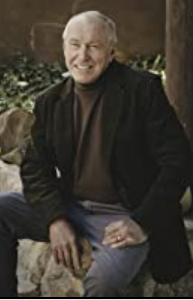Born and raised in New Jersey, Steve Bassett became an accomplished journalist, known for finding stories in the most unlikely of places. Steve Bassett started as a feature reporter in New Jersey and then in Illinois and Utah. He later worked as a Special Urban Affairs writer for the Associated Press in Phoenix and San Francisco. Eventually he made his way onto CBS television news, where he won three Emmy Awards for his investigative documentaries and the California Bar Associate’s first Medallion Award for Distinguished Reporting on the Administration of Justice. Throughout it all, Steve Bassett kept his passion for writing, having authored five books, among them his Award-winning Passaic River Trilogy.
P.C.R. The setting of your Passaic River Trilogy is in post-World War II Newark, New Jersey. Why did you decide to set the plot of your novel in this era?
S.B. It has been a long time, but the immediate post-World War II years in America have been seriously explored in our fiction, although there has been no shortage of non-fiction works dealing with this era. This is a shame because these were the years when the country’s urban deterioration began and no one was paying attention amid the back-slapping, flag-waving and outright arrogance that followed victory. If notice had been taken, troubling signs could be seen in cities from coast-to-coast: war time jobs with their fat paychecks had vanished; street crime, always an inner city problem, was out of control; elected officials were bought and sold as crime became a deeply embedded institution; police brutality increased; hopelessness led to rage as poor white, black and brown denizens of our inner cities competed for meager jobs and housing; and the terms “slum lords” and “crime bosses” became common vernacular.
In 1967, these were the sparks that ignited a firestorm that swept through most of Newark’s marginalized inner city ghetto, leaving twenty-six dead and entire neighborhoods in ashes, including the one where I was born, raised and spent most of my childhood. I was an Urban Affairs investigative reporter working for the Associated Press in San Francisco when I returned to Newark and was devastated by what I saw: empty lots where two movie theaters once stood; blocks of burnt-out buildings that were once thriving black store fronts; a boarded-up restaurant; and all of this a wake-up call that the fear and despair of past years would never again be mute.
My visit planted the seeds for my Passaic River Trilogy, three historical works of crime fiction that explore how the chaos that rules U.S. cities today took root and how greed, organized crime, and official corruption paid better than the endless task of safeguarding our civil rights.
***
P.C.R. Your novels have a surprising amount of content about little-known historical events. For example, I personally found myself learning about the Haymarket Riots, that took place in Chicago in May of 1886, while translating Payback. Why is it so important for you to include history in your novels?
S.B. The Trilogy is historical crime fiction, and references to the past are used sparingly and only when they support the narrative. Shakespeare said it all in The Tempest, when his Antonio proclaimed, “What’s past is prologue,” that history provides the context for the present. The Haymarket Riots that led to eight deaths were the apex of labor unrest that swept the nation in the 1880s and reached its height in the United States in the 1930s.
In Payback, the riots serve as a historical metaphor for the violence of the Passaic and Patterson garment worker strikes in New Jersey that transformed two of the book’s characters, the ex-communist priest, Father Peter Majeski and Samuel, an embittered communist agitator.
The fictional M.L. Kraus chemical conglomerate is patterned after a vast German industrial empire, bigger today than in the pre-war years when it shared enormous profits with an American commercial elite, including DuPont, Standard Oil, General Electric, and publisher William Randolph Hearst. For two decades they competed for places on the Hitler and Social Democrats’ bandwagon.
My research uncovered many historical surprises. For example, it was impossible to shape the German American Bund into a plot centerpiece without going into pre-war details that describe a bi-coastal, neo-Nazi cult that indoctrinated thousands of German American kids, male and female, at their secret training camps. I was surprised to learn that three of them were in New Jersey.
***
P.C.R. I love your writing because I feel immediate compassion for the protagonists in your novels, such as Nick Cisco or Sergeant Kevin McClosky. How do you build characters? Are any of your characters based on someone you know?
S.B. Frankly, I can’t see how a novelist can create a character completely out of whole cloth. Every one of my characters is molded together with bits and pieces of people from the real world. I find character development very exciting and enjoyable even though it does require hours of scripting, editing, and rewriting to get it right.
Without knowing it, I started breathing life into the two protagonists you mentioned, Police Lieutenant Nick Cisco and his sidekick Sergeant Kevin McClosky, during my very early years working coast-to-coast as an itinerant news scribbler. I did not want the Trilogy to be a prosaic police procedural work of crime fiction, all too common today. Instead of placing what I’ve always considered undue importance on a cop’s tools of trade, I wanted the reader to comprehend and hopefully understand the cop who used the tools. I never attempted to make my novels an “easy read.”
Cisco and McClosky are flawed men worn down by doing a hopeless job in a city where crime is endemic. Eventually they are seduced into turning rogue in an illegal investigation that promises rapid promotion and prestige.
Cisco’s persona is based in large part on the widespread wife-cheating I saw in New Jersey, Illinois, Utah, Arizona and California police departments. To a lesser degree, the same is true with McClosky, a gambling addict who loved the good life that was fueled by the cash collected from betting on fixed fights controlled by the mob.
I never tell anyone how to read and interpret a novel, that’s senseless. Payback is a work of character, time and place and when viewed as a small, tightly controlled urban universe, there are rules, verbalized or not, that control the streets. This is especially true in the ethnic neighborhoods where women were born, raised, married and had babies. With the two main female characters, I explore two of the rules – fight or flight. I wanted to show two women confront an all too common urban dilemma, adultery.
I interviewed women of all ages over the years and discerned both ends of life’s spectrum, the good and the bad. Two composites emerged, Connie Cisco a devout Catholic, who never gave up hope that she and Nick could salvage their marriage. She fled from Nick and moved in with her devout parents. Thus, creating a fortress of prayer and devotion where she could safely come to grips with her life.
Grace De Marco never fled, but vowed to fight. She is a rarity seldom found in tightly knit Italian neighborhoods during the 1930s. Beautiful and with a college degree, she was a real catch. She married a jerk, but he had money so she endured until one afternoon in a fit of rage he punched her in the face. Grace ended the marriage, and instead of meekly disappearing she vowed to take him for everything he had.
***
P.C.R. Your style of writing is very vivid and descriptive. Creating and refining one’s own unique style of writing is important. Any advice for other writers?
S.B. After more than thirty years working as a journalist, I had to adapt to the profession’s changing physical, mental and philosophical demands. Let’s start with basic stuff. In the beginning I was pounding out obituaries and basic street crime stories on a rickety Royal typewriter with its jammed keys and broken ribbons. Like other newspaper, magazine and wire service reporters, I initially viewed radio and television news suitable only for the illiterate masses. After all, it takes some effort to crack open reading material and follow it word-for-word. This early holier-than-thou attitude vanished when we saw the size of broadcast media paychecks.
You asked me what advice I have for other writers. You’ve already learned my background, so here are a few notes on what worked for me, but may not be gems of wisdom for others. First, and this was very important for me, I asked myself why in the hell I wanted to be a writer. Having worked under deadline pressure for years, I recognized that if I wanted to eat, “writer’s block” was for me a myth. Having discarded this notion, it was time to decide what to write about and for whom.
Here is where the axiom, “write about what you know,” comes into play. For me, the decision was easy. As a reporter I rubbed shoulders with cops, crooks, corrupt officials and so-called civil servants. My writing perspective was shaped by the realization that we are all flawed, and when explored historically in urban settings, provides endless material for crime fiction. The foundation is research and then, even more research. The dialogue in Payback, as it is in the first book of my Trilogy, Father Divine’s Bikes, is the result of hours of fact-checking especially when it comes to street slang, profanity and coarse sexual and racial references that were common during the post-war years. Phony dialogue kills a good story, and I decided early not to allow political correctness to color my narrative and dialogue. If it’s true for the character, use it.
***
P.C.R. Since 1945 forensic sciences have changed dramatically, effecting both how crimes occur and how law enforcement catches criminals. Methods like genetic mapping or DNA matching were not available around 1945. How do you think in general that future technologies might affect the crime genre?
S.B. Forensic science is changing so rapidly, I can’t see how anyone can predict what the future holds.
***
P.C.R. How much research did you do into the actual world of crime fighting?
S.B. During my years as a police, courtroom, city hall and urban affairs investigative reporter, I was unconsciously collecting research material without giving any thought that it would eventually be the foundation for a new career. Two rules a news reporter must follow if he wants to keep his job are just as valid when writing novels, meeting deadlines and keeping prose as simple and direct as possible.
***
P.C.R. What advice would you give for aspiring crime novelists?
S.B. I think I’ll defer to those who have a lot more to offer by way of advice than I do, Raymond Chandler and William Somerset Maugham. My first Chandler novel was “The Lady in the Lake,” and after reading it, I became a Chandler addict, devouring “The Long Goodbye,” “The Big Sleep,” and the rest of his novels at a record pace. The Los Angeles he created is unsurpassed for mood, time and place.
Chandler was always reluctant to give advice, but in one interview for a magazine he surprised a reporter by stating that a crime fiction writer must develop a style that allows him to stand out from other crime fiction writers. He said this style should never change because to do so would disappoint, if not anger, loyal readers, and losing them could be his death knell. For aspiring writers like myself, that’s a simple enough rule to follow.
Somerset Maugham, as prolific a novelist you’ll ever find, provided sage advice that has served me well making it a hell of a lot easier to spin a good story without adhering to strict guidelines for my plot. In his introduction to Ashenden: Or the British Agent, he opined that a novel’s plot is subservient to mood, character, time and place. Maugham believed the plot was merely the skeleton for a novel, providing the bones on which to attach the muscle, sinews, ligaments, blood vessels, flesh and other organs that, when pieced together, form the body of a literary work of fiction. Given this wide literary opening, it’s up to the author to decide how wide or narrow, long or short, healthy or diseased these component parts should be. Once a decision is made, it’s only natural for the plot to change accordingly.
***
P.C.R. What are you working on at the moment?
S.B. Right now, I am working toward the completion of the final, edited draft of the third book of my Trilogy, and I am confident it will be ready for publication by the end of 2021. As with the first two books of the Passaic River Trilogy, the setting is Newark, the time is the immediate post-WWII years. The main characters continue to evolve, and the objective is to explore a universal social problem that had been kicked under the rug for decades, and in 1947, was no longer accepted by its victims.
P.C.R. Thank you for the interview.
Links:
Steve Bassett’s website: https://stevebassettworld.com/

https://mobile.twitter.com/SteveBassett19

